As we strive to become more environmentally conscious, organic waste management in homes has gained significant attention both as a means to reduce waste and promote sustainable living. Recycling organic waste through residential food waste collection services, home composting, and proper waste disposal can greatly impact landfill reduction and create a greener, more environmentally sustainable lifestyle.
Together, let us explore the various aspects of managing residential organic waste, embracing food waste composting, and utilizing resources like compostable bags, curbside collection, and other waste recycling initiatives.
Key Takeaways
- Organic waste management in homes can significantly contribute to landfill reduction and environmental sustainability.
- Residential food waste collection services promote recycling and more efficient waste disposal options.
- Composting at home can turn food scraps into a valuable resource, diverting waste from the waste stream.
- Using compostable bags and participating in curbside collection programs can positively impact waste reduction efforts.
- Home composting promotes a circular waste economy, reducing our reliance on landfill disposal.
The Fundamentals of Composting at Home
Composting is an eco-friendly solution for managing organic waste generated within households. By engaging in home composting, you can convert food scraps, yard waste, and other organic materials into a valuable soil amendment known as “black gold,” significantly reducing solid waste and benefiting the environment. Let’s delve into the composting process and understand why compost is referred to as “black gold.”
Understanding the Composting Process
Composting is a natural process wherein organic waste, including food scraps, leaves, and kitchen scraps, are broken down by microorganisms like bacteria and fungi, along with decomposers like worms.
Waste4Change: Balance the compost ingredients by maintaining a ratio of 3:1 for brown waste (carbon) to green waste (nitrogen). This balance is crucial for efficient composting, accelerating the decomposition process and producing high-quality compost.
This decomposition process transforms solid waste into nutrient-dense organic material, perfect for gardening, horticulture, and agriculture. In essence, home composting mimics nature’s recycling system to efficiently handle organic waste and contribute to the overall environmental health.
The Importance of “Black Gold”
So why do we call compost “black gold”? Rich in nutrients and essential elements, compost is a highly beneficial soil amendment that sustains plant growth and improves soil quality. Created from kitchen scraps and yard waste, this organic material delivers numerous benefits, such as:
- Enhancing soil structure, promoting aeration and proper drainage.
- Providing essential nutrients to plants and improving their growth.
- Sustaining beneficial microorganisms that contribute to soil fertility.
- Reducing the need for chemical fertilizers, thus protecting the environment.
By establishing a home composting system, you not only make the most of your organic waste but also play an important role in preserving the environment and promoting a sustainable lifestyle.
Organic Waste Management in Homes
As the importance of organics recycling and composting continues to grow, households are urged to participate in food waste recycling programs and make use of the collection services offered by their local municipalities. With residential food waste accounting for a significant portion of the waste stream, effective waste management at home is essential in reducing environmental pollution and greenhouse gas emissions.
Entities like the US EPA advocate for separating organic materials from the general waste stream, encouraging the use of composting facilities or home composting systems. This not only minimizes landfill contributions but also aids in the reduction of harmful emissions.
Proper organic waste management at home can drastically reduce an individual’s carbon footprint and contribute to a more sustainable environment.
Below are some key collection programs and services helping households manage their food waste:
- Curbside organics recycling programs
- Drop-off composting facilities
- Residential composting systems
- Community composting initiatives
By participating in these recycling programs and composting initiatives, households can contribute to tangible environmental impact reduction. Meanwhile, local municipalities and waste management authorities work towards providing accessible and efficient services to facilitate widespread adoption.
| Collection Program | Benefits |
|---|---|
| Curbside organics recycling programs | Convenient and easy-to-use, helping to increase participation in organic waste recycling |
| Drop-off composting facilities | Allow residents without home composting systems to still contribute to composting efforts |
| Residential composting systems | Encourage individuals to take responsibility for their waste management while benefiting from nutrient-rich compost |
| Community composting initiatives | Promotes collaboration and education within neighborhoods, fostering a sense of shared responsibility for waste reduction |
In conclusion, managing organic waste at home through recycling and composting practices is a vital component in tackling the waste stream and reducing greenhouse gas emissions. By utilizing available collection services and participating in recycling programs, households can make a profound impact on the environment and build a more sustainable future.
Why Composting Benefits Your Household and the Environment
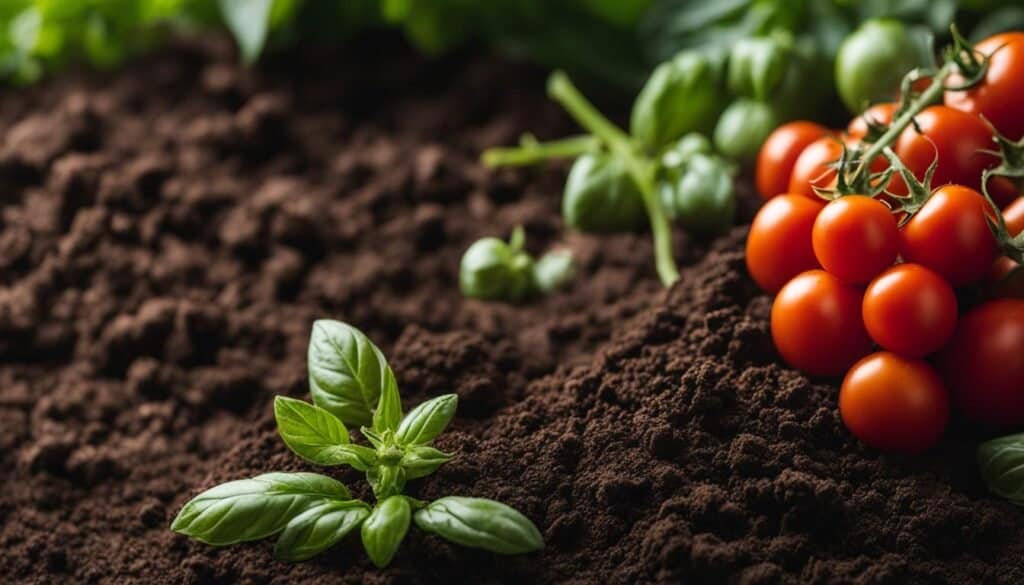
Composting brings a plethora of advantages to both households and the wider environment by drastically reducing the impact on landfills and minimizing methane emissions, which are powerful greenhouse gases that drive climate change. Effective waste collection and management practices can redirect organic waste from landfills, which translates into cost savings for citizens and municipalities. Additionally, compost use supports soil health and water conservation, both of which are critical for sustainable agriculture. This two-pronged effect nurtures a healthier environment while cutting down the financial and ecological burdens of solid waste management.
Reducing Landfill Waste and Methane Emissions
Dedicating more time and resources to composting significantly curbs landfill waste and lowers methane emissions. By diverting organic waste from landfills, municipalities can observe substantial cost savings in waste management processes and minimize the generation of greenhouse gases.
According to the United States Environmental Protection Agency (EPA), landfills are the third-largest source of methane emissions in the US, accounting for almost 15% of total emissions in 2018.
When households actively participate in composting initiatives, they contribute to environmental conservation efforts such as limiting landfill expansion and reducing the atmospheric concentration of methane, a major contributor to climate change.
Enriching Soil and Conserving Water
The use of compost not only enhances soil health but also fosters water conservation by improving the water retention capacity of the soil. A healthier soil is fundamental for sustainable agriculture practices, ensuring that land remains fertile and productive for future generations.
- Improving soil structure: Compost strengthens soil structure by promoting the formation of stable aggregates, which in turn improves aeration and water retention.
- Boosting nutrient availability: As compost decomposes, it releases essential nutrients, making them more accessible for plants to absorb.
- Supporting beneficial organisms: By introducing compost to soil, you provide a welcoming environment for beneficial microorganisms to thrive and further enrich the soil.
With these benefits in mind, it becomes clear that composting serves as an invaluable tool to support thriving ecosystems and maintain a healthy planet. By embracing composting as part of our waste management routines, we can each do our part to promote a greener, more sustainable future for all.
Types of Home Composting Techniques
Home composting offers a range of techniques to accommodate various factors like available space, organic waste amounts, and the desired speed of the compost process. In this section, we will explore the two primary compost methods and discuss how to select the most suitable one for your home, ensuring efficient waste recycling, waste reduction, and food waste composting.
Breaking Down Cold vs. Hot Composting
Cold composting is a slow, low-effort method where nature takes its course, breaking down organic materials like residential food waste, yard trimmings, and other biodegradable matter. This approach typically requires less maintenance but takes more time to produce finished compost.
Hot composting, on the other hand, is a faster and more intensive approach, demanding attention to carbon-to-nitrogen ratios and regular monitoring of temperature and moisture levels. This method accelerates the compost process, producing nutrient-rich compost within a few weeks to a couple of months.
Choosing the Right Method for Your Home
To determine the best composting technique for your household, consider the following factors:
- Available space: Cold composting requires a larger area to house the composting materials, while hot composting can be done in smaller, contained systems like tumblers.
- Organic waste volume: Hot composting is more suitable for homes producing a considerable amount of food waste and yard trimmings, while cold composting may be adequate for smaller amounts of waste.
- Desired speed of compost production: Hot composting produces compost more quickly, while cold composting takes a longer time.
- Waste management plan: Your personal waste management plan, along with factors like curbside collection services, may also guide your choice of compost method.
By selecting the appropriate composting technique for your home, you can effectively participate in waste recycling efforts and contribute to a greener environment.
Starting Your Composting Journey
Embarking on a composting journey involves choosing the most convenient method to recycle your organic waste into nutrient-rich compost. Options range from inexpensive, classic compost piles to modern food waste converters and thermal composters that optimize composting conditions. Regardless of the method chosen, the core principle remains the same: repurposing food scraps and yard waste into a biodegradable resource, thereby reducing overall waste management operations and disposal costs. Whether in a rural or urban setting, beginning the composting process represents a meaningful step toward sustainable waste reduction.
Here are some popular composting methods and equipment to help you get started:
| Method | Description | Pros | Cons |
|---|---|---|---|
| Compost Pile | A simple heap of organic waste such as food scraps and yard waste, decomposing naturally over time. | Inexpensive, minimal maintenance | Can be slow, requires space |
| Organic Waste Converter | A device that accelerates the breakdown of organic waste through controlled conditions such as heat and moisture. | Fast composting, reduced odors | More expensive, requires electricity |
| Food Waste Converter | A specialized converter designed specifically for food waste processing. | Compact, efficient for food waste | Not suitable for yard waste, may require replacement parts |
| Thermal Composter | An insulated container that accelerates decomposition by retaining heat generated during the process. | Fast composting, reduced odors | Higher initial cost, monitoring temperature is necessary |
In conclusion, starting your composting journey is a worthwhile endeavor to help manage your household’s organic waste and contribute to a more sustainable world. Carefully consider the various composting methods and equipment available, and choose one that aligns with your specific needs and waste disposal goals.
Guidelines for Balancing Your Compost Pile
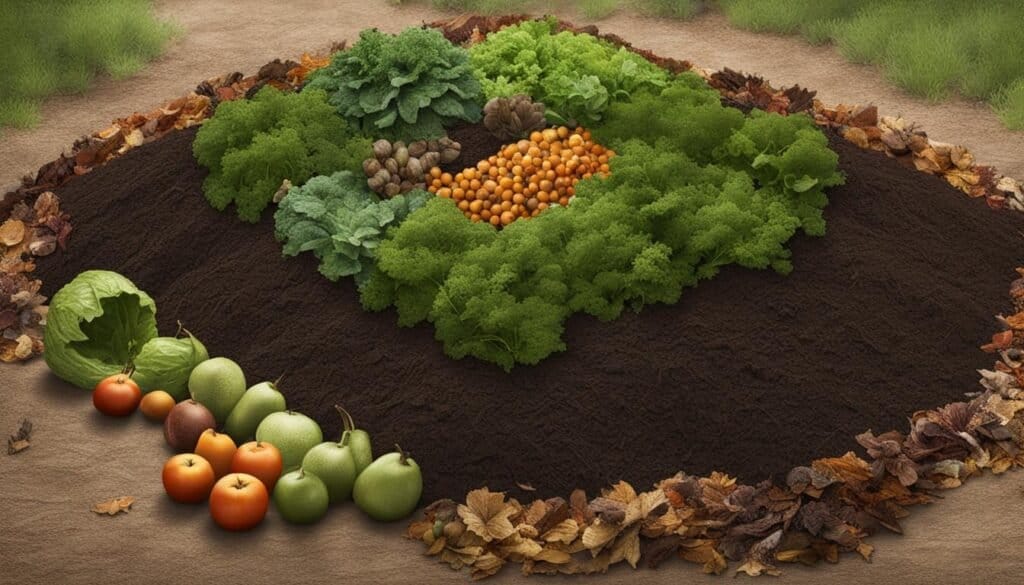
Achieving a successful compost pile depends on maintaining a delicate balance of compost ingredients and carbon-to-nitrogen ratios. By understanding the roles of greens and browns and optimizing these proportions, you can ensure efficient decomposition, waste recycling, and waste reduction in your household.
The Role of “Greens” and “Browns”
Greens are nitrogen-rich materials like food scraps and grass clippings, while browns are carbon-rich materials such as leaves and twigs. These two types of ingredients are essential for composting successfully. Greens provide vital nitrogen that feeds the microorganisms responsible for breaking down the organic matter. On the other hand, browns contribute carbon, which these microbes use for energy.
Maintaining the Ideal Carbon-to-Nitrogen Ratio
The ideal carbon-to-nitrogen ratio for a compost pile is between 25:1 and 30:1. This optimal ratio ensures that the decomposition process is efficient and generates fertile compost. To achieve this balance, carefully manage the addition of greens and browns to your compost pile, adjusting their proportions as needed.
A well-balanced compost pile also requires moisture and air circulation. Be sure to turn your pile periodically, allowing oxygen to penetrate the organic matter and support aerobic decomposition. It is also vital to maintain appropriate moisture levels, neither too dry nor too wet, to facilitate microbial activity.
When you combine the right balance of greens and browns with optimal moisture and air circulation, your compost pile will thrive and yield nutrient-rich organic matter compatible with compostable bags. As a result, your household will contribute to effective waste reduction and responsible organic waste recycling.
Breaking Down Composting Systems for Home Use
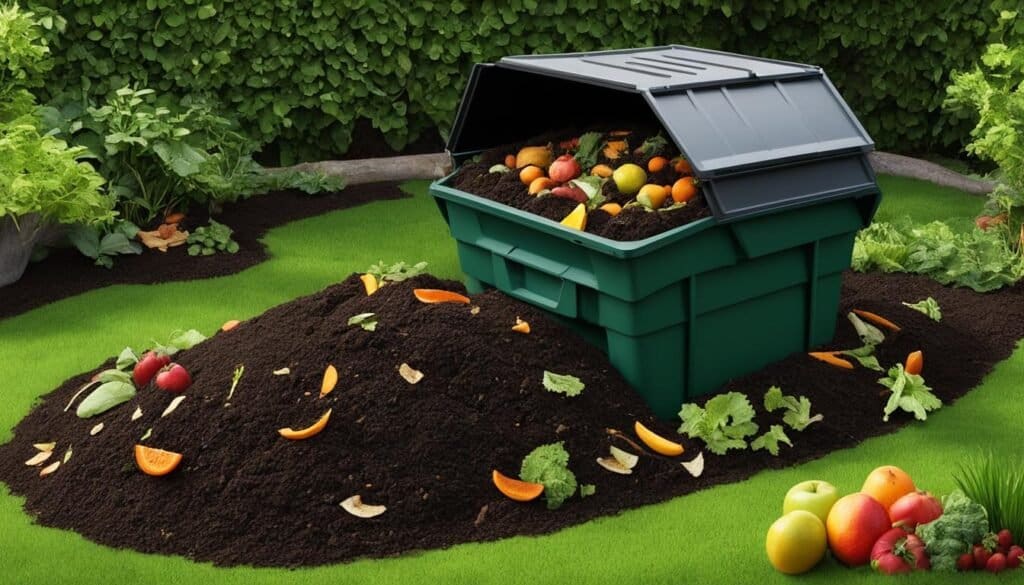
Understanding various composting systems is crucial for efficient organic material breakdown at home. With diverse home composting solutions available, households can choose the method that best aligns with their needs and the volume of waste produced. Let’s explore the three main composting methods—aerobic digestion, worm composting, and anaerobic digestion—and the respective composting systems associated with each.
Aerobic, Worm, and Anaerobic Composting Explained
Aerobic digestion is ideal for households generating a substantial amount of organic waste and seeking to speed up the composting process. This method actively involves oxygen and requires regular turning of the compost in order to maintain optimal conditions.
Worm composting, or vermicomposting, utilizes redworms to create nutrient-rich compost. Suited for indoor setups, this technique provides a slower yet highly efficient method to break down organic materials.
Anaerobic digestion operates in a sealed, oxygen-free container, converting waste into both biogas—a renewable energy source—and nutrient-rich fertilizer. This method is often utilized in community-scale composting systems and larger-scale home composting operations.
Choosing the Right Composter for Your Needs
Selecting the appropriate composting system is key to achieving an efficient home composting process. Various types of composting bins and systems cater to different composting methods and household requirements:
- Standard composting bins: These containers enable easy manual turning for aerobic digestion, making them a suitable choice for backyard composting.
- Tumbler composters: Equipped with a rotating drum, tumbler composters facilitate easy turning and quick compost preparation, ensuring optimal aeration for aerobic digestion.
- Worm composting bins: Designed for worm composting operations, these bins provide a hospitable environment for redworms to thrive and break down organic materials into nutrient-rich compost.
- Biogas digesters: These specialized systems support anaerobic digestion by creating an oxygen-free environment to produce both biogas and fertilizer.
Understanding the pros and cons of each composting system can help you navigate the path towards effective organic materials recycling, ultimately resulting in nutrient-rich compost for your garden.
Composting Challenges and Solutions
Though composting at home is a highly effective way to manage food waste, it can come with its fair share of composting challenges. Home composters may encounter issues such as maintaining the ideal conditions within their compost pile, preventing pests and bad odors from disrupting the process. Fortunately, there are several solutions available to ensure a healthy composting operation while preserving the positive impact of recycling programs.
One solution to minimize pest problems is to properly maintain your compost pile by covering your food waste composter. This can deter pests such as rodents and insects from invading your compost bin. Additionally, make sure to bury food scraps and avoid adding meat and dairy to the compost pile as they attract pests.
To manage odor issues, keep your compost pile well-aerated and maintain a balanced ratio of organic materials within the compost bin. The proper balance between “greens” and “browns” is crucial for effective food waste management. Here’s a summary table of greens, browns, and materials to avoid in your compost pile:
| Greens | Browns | Materials to Avoid |
|---|---|---|
| Fruit & vegetable scraps | Leaves | Meat & bones |
| Grass clippings | Straw & hay | Dairy products |
| Coffee grounds & filters | Cardboard & paper | Fats & grease |
| Tea leaves & bags | Small branches, twigs & wood chips | Synthetic materials |
Moreover, engaging in local recycling programs and implementing holistic food waste management systems at home can provide guidance on effective pest management and odor control. Following these guidelines and tips, your compost pile will function optimally, creating a welcoming space for decomposing organic materials and promoting a healthier environment.
Using Composted Material in Your Garden
Optimal garden health can be achieved through the effective use of composted material as a soil amendment, which enriches the soil and supports plant growth. Let’s explore how integrating compost can improve soil structure, microbial activity, and moisture retention, as well as the advantages of using compost tea as a liquid fertilizer for your plants.
Improving Soil Health with Compost
Compost plays a significant role in enhancing garden soil in various ways:
- Soil structure: The addition of compost can improve soil structure, promoting better root growth and water infiltration.
- Nutrient retention: Compost enhances nutrient retention in soil, ensuring essential minerals are readily available for plant uptake.
- Microbial activity: Compost fosters a thriving ecosystem of beneficial microorganisms, which are crucial for a healthy garden and microbial activity.
Incorporate compost into your
garden beds
as an organic fertilizer, which will gradually release essential nutrients, supporting vibrant and robust plants.
Creating and Using Compost Tea
Compost tea, a liquid solution derived from steeped compost, serves as an effective alternative to conventional liquid fertilizers. It offers an immediate nutrient boost for garden and potted plants alike while promoting plant health and disease resistance. To create compost tea, mix equal parts compost and water and let it steep for several days. Strain the mixture and apply it as a liquid fertilizer to plants, improving their overall vigor.
The use of composted material in your garden not only supports healthier plant growth but also helps retain soil moisture, resulting in a more sustainable garden environment. With the advantages of compost and compost tea at your disposal, you can cultivate a flourishing and vibrant garden using natural, organic fertilizer.
The Global Impact of Composting on Food Waste Reduction
As the world faces the growing challenge of food waste, composting has become an essential solution to address this issue. With international observances such as the International Day of Awareness of Food Loss and Waste highlighting the importance of waste reduction, composting plays a critical role in reducing greenhouse gas emissions and promoting sustainable living.
Tackling the Challenge of Food Waste
According to the United Nations Environment Programme (UNEP), approximately 931 million tons of food are wasted annually worldwide. This waste not only contributes to greenhouse gas emissions but also depletes valuable resources. Composting offers an effective solution by facilitating the biodegradation of organic materials into nutrient-rich fertilizer, thus transforming waste into a valuable resource. Moreover, composting mitigates soil degradation and supports sustainable agriculture, further augmenting its global impact on waste reduction.
International Efforts in Composting and Waste Reduction
Various international efforts have been initiated to promote composting and waste reduction, such as decentralized composting initiatives and centralized composting plants. Decentralized composting allows communities to manage their organic waste locally, reducing transportation costs and carbon emissions. Centralized composting plants, on the other hand, enable large-scale processing of organic waste, promoting resource recovery and the generation of renewable energy. By increasing awareness and participation in composting, these efforts support the global fight against food waste and contribute to a more sustainable future.
Conclusion on Organic Waste Management in Homes
In conclusion, managing food waste through composting significantly reduces our environmental impact and contributes to a greener future. Incorporating organic waste recycling into comprehensive waste management strategies enables us to reduce municipal solid waste and mitigate the effects of climate change. As more communities embrace these practices, we move closer to a sustainable, zero-waste lifestyle.
Not only does composting minimize waste in landfills, but it also promotes green living and plays a pivotal role in climate change mitigation. Prevention and recycling of organic waste, along with composting, work hand-in-hand to preserve our environment, benefiting both the current and future generations. By driving these efforts forward, we create a better and greener world for us all to enjoy.
As we continue to refine our waste management habits and adopt composting as a means of waste prevention, the importance of individual and collective responsibility in managing food waste cannot be overstated. With the combination of organic waste recycling, composting, and adopting a zero-waste lifestyle, we can make a significant difference in curbing the adverse effects of food waste on our planet. Let’s all join in and contribute to a greener, more sustainable future.
FAQ on Food Waste At Home
Q: What is organic waste management?
A: Organic waste management refers to the process of handling, collecting, and recycling organic waste materials such as food scraps, yard trimmings, and other biodegradable waste in an environmentally friendly manner.
Q: What are some ways to effectively manage residential organic waste?
A: Effective residential organic waste management involves utilizing organic waste collection services, composting food and yard waste, and responsibly disposing of wasted food through methods like vermicomposting.
Q: How can I recycle food waste at home?
A: To recycle food waste at home, you can collect your food scraps and use them for composting, either by setting up a composting bin in your backyard or using a vermicomposting system.
Q: What is the importance of composting food and yard waste?
A: Composting food and yard waste helps reduce the amount of household waste sent to landfills, enriches the soil, and reduces greenhouse gas emissions, contributing to a more sustainable and eco-friendly waste management system.
Q: What are some common methods for collecting food waste in residential spaces?
A: Common methods for collecting food waste in residential spaces include utilizing separate bins for food and yard waste, and participating in waste collection programs that offer curbside collection for organic waste.
Q: How can I reduce wasted food in my household?
A: You can reduce wasted food in your household by properly storing food, planning meals to minimize leftovers, and being mindful of portion sizes to avoid excess food waste.
Q: What are the benefits of community composting programs?
A: Community composting programs promote waste reduction, encourage community engagement, and provide the opportunity to create high-quality compost that can be used to improve soil quality and support local gardening initiatives.
Q: What items can be included in residential organic waste for collection?
A: Residential organic waste for collection typically includes food and yard waste, such as fruit and vegetable scraps, coffee grounds, eggshells, grass clippings, and plant trimmings.
Q: What are some alternative uses for finished compost?
A: Finished compost can be used as a natural fertilizer for gardens, lawns, and indoor plants, as well as a soil amendment to improve soil structure and promote healthy plant growth.
Q: How can residential communities contribute to effective organic waste management?
A: Residential communities can contribute to effective organic waste management by educating residents on proper waste sorting, offering incentives for participating in composting programs, and collaborating with waste collection services to maximize organic waste recycling.

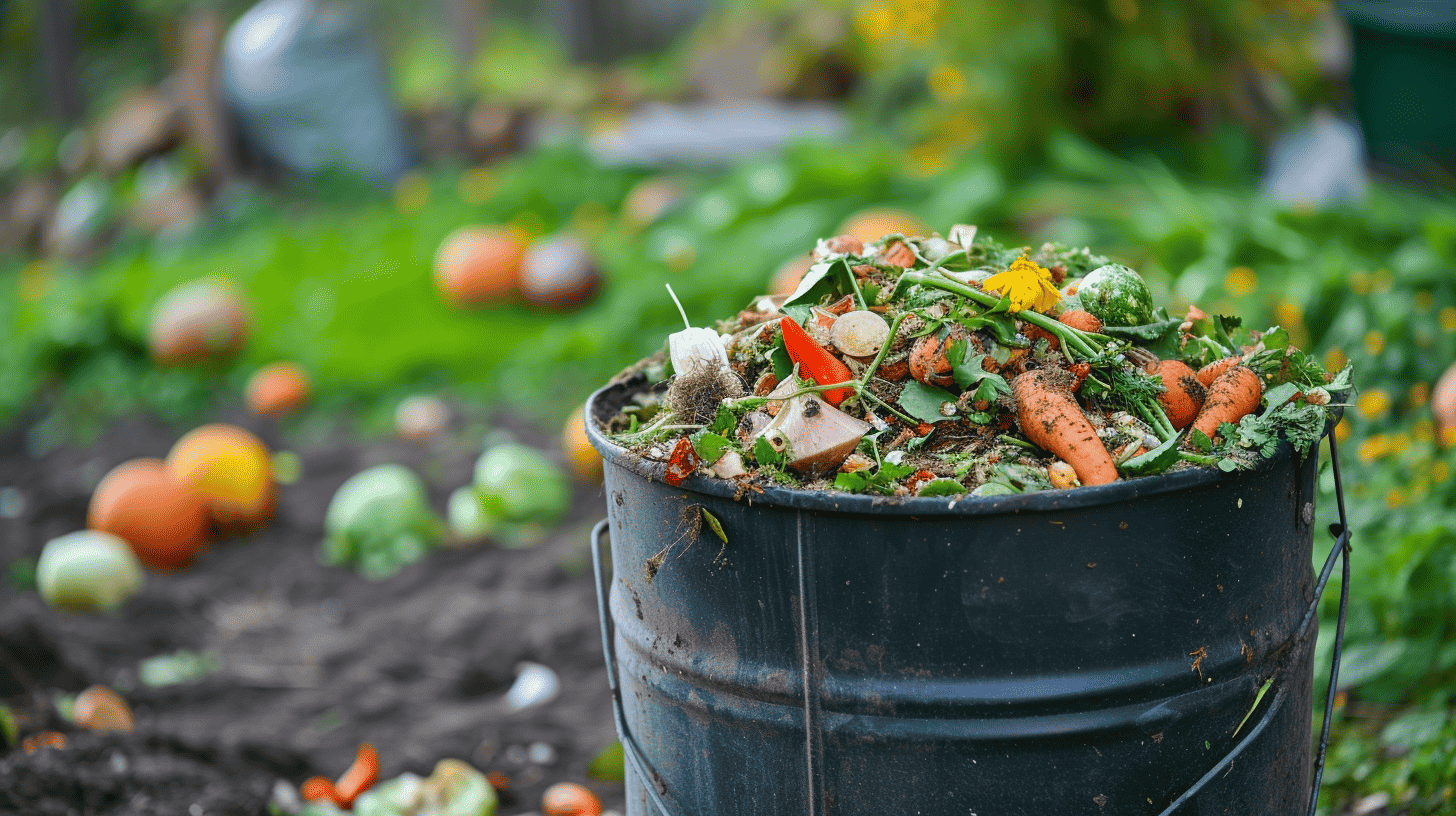


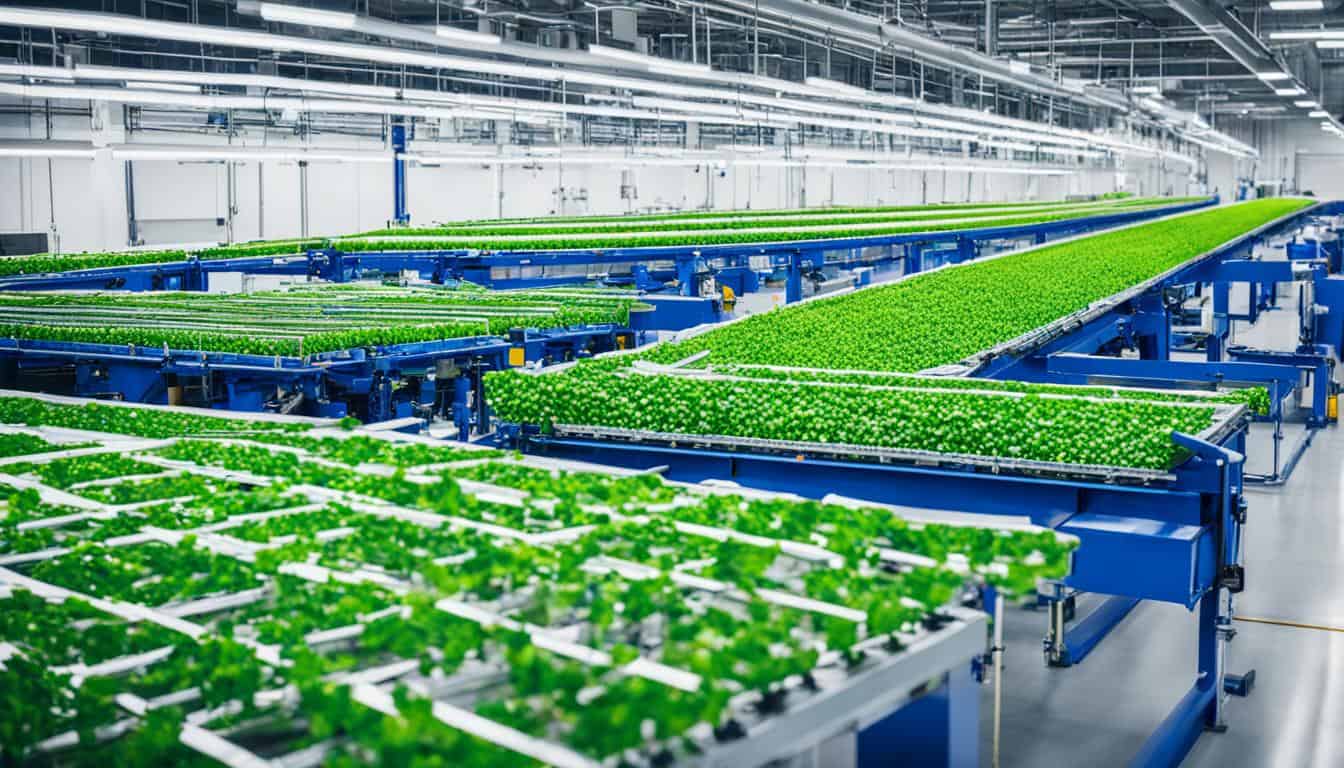
Leave a Reply